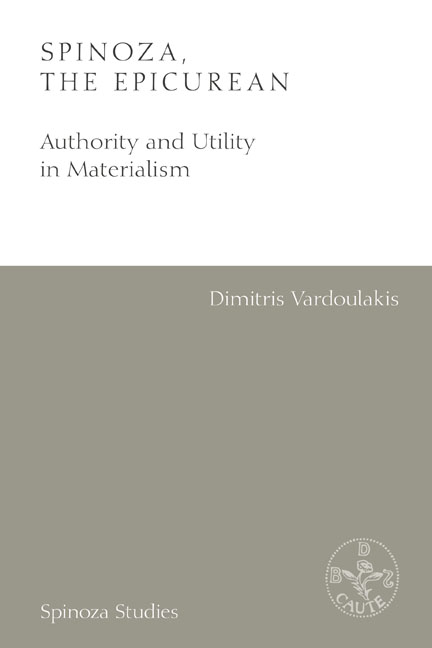Book contents
- Frontmatter
- Contents
- Reference Guide to Spinoza’s Work
- Acknowledgements
- Dedication
- Preamble
- Introduction: Why is Spinoza an Epicurean?
- 1 Freedom as Overcoming the Fear of Death: The Dialectic of Authority and Utility in the Preface
- 2 The Power of Error: Moses, the Prophets and the People (chapters 1, 2 and 3)
- 3 Philonomianism: Law and the Origin of Finitude (chapter 4)
- 4 Political Monism: The Primacy of Utility over Authority (chapters 5 and 6)
- 5 Love your Friend as Yourself: The Neighbour and the Politics of Biblical Hermeneutics (chapters 7 to 13)
- 6 The Freedom to Philosophize: The Two Paths to Virtue (chapters 14 and 15)
- 7 Fear and Power: Natural Right and Authorization in Spinoza and Hobbes (chapter 16)
- 8 Theocracy: On the State of Authority (chapters 17 and 18)
- 9 The Authority to Abrogate: The Two Paths to Virtue and the Internal Enemy (chapters 19 and 20)
- Conclusion: The Limitation of Spinoza’s Epicureanism
- Bibliography
- Index
4 - Political Monism: The Primacy of Utility over Authority (chapters 5 and 6)
Published online by Cambridge University Press: 20 October 2020
- Frontmatter
- Contents
- Reference Guide to Spinoza’s Work
- Acknowledgements
- Dedication
- Preamble
- Introduction: Why is Spinoza an Epicurean?
- 1 Freedom as Overcoming the Fear of Death: The Dialectic of Authority and Utility in the Preface
- 2 The Power of Error: Moses, the Prophets and the People (chapters 1, 2 and 3)
- 3 Philonomianism: Law and the Origin of Finitude (chapter 4)
- 4 Political Monism: The Primacy of Utility over Authority (chapters 5 and 6)
- 5 Love your Friend as Yourself: The Neighbour and the Politics of Biblical Hermeneutics (chapters 7 to 13)
- 6 The Freedom to Philosophize: The Two Paths to Virtue (chapters 14 and 15)
- 7 Fear and Power: Natural Right and Authorization in Spinoza and Hobbes (chapter 16)
- 8 Theocracy: On the State of Authority (chapters 17 and 18)
- 9 The Authority to Abrogate: The Two Paths to Virtue and the Internal Enemy (chapters 19 and 20)
- Conclusion: The Limitation of Spinoza’s Epicureanism
- Bibliography
- Index
Summary
What is the relation of priority between authority and utility, the two terms of the epicurean dialectic? Does authority cause utility or is it the other way round? What comes first, authority or utility? Spinoza's conception of democracy stands or falls with this problematic. If authority means that which is impervious to argumentation and if democracy requires the freedom to decide about collective actions, then the priority of authority would suggest that democracy is merely a consequence of authority. It is not easy to reverse the relation, since what does it mean to have democracy before the instituted kind of power modelled on authority's structure of command and obedience? That is, how can we conceive of democracy before written law?
The relation between authority and utility may seem to mirror one of the major issues in the interpretation of the Theological Political Treatise, namely, whether the prosperity and well-being of the community and the state are ensured by obedience or reason. The vast majority of commentators on Spinoza's Treatise feel compelled to take either side. As I suggested in the Introduction, I present the relation of authority and utility as a dialectic to bypass the disjunction of – or, differently put, to overcome the false binary of – either obedience or reason. Nonetheless, the dialectical relation cannot evade the problematic of what comes first, authority or utility.
Let me highlight some of the complexities of this problematic via Michel Foucault. He develops a theory of power understood as something constructed, as potestas, which in Foucault's terms includes what we call authority here. It is fundamental to this theory that there is no power as such, but it is rather always accompanied by resistance. His approach consists, as he puts it in his essay ‘The Subject and Power’, in
taking the forms of resistance against different forms of power as a starting point … using this resistance as a chemical catalyst so as to bring to light power relations, locate their position, find out their point of application and the methods used. Rather than analyzing power from the point of view of its internal rationality, it consists of analyzing power relations through the antagonism of strategies. For example, to find out what our society means by sanity, perhaps we should investigate what is happening in the field of insanity. And what we mean by legality in the field of illegality.
- Type
- Chapter
- Information
- Spinoza, the EpicureanAuthority and Utility in Materialism, pp. 141 - 171Publisher: Edinburgh University PressPrint publication year: 2020



